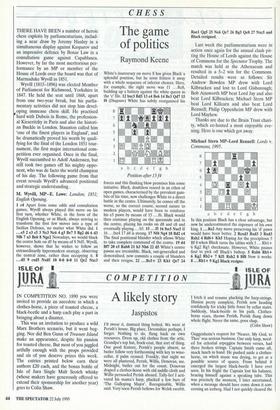CHESS
The game of politics
Raymond Keene
THERE HAVE BEEN a number of heroic chess exploits by parliamentarians, includ- ing a near draw by Jeremy Hanley in a simultaneous display against ICasparov and an impressive defence by Bonar Law in a consultation game against Capablanca. However, by far the most meritorious per- formance by an MP or member of the House of Lords over the board was that of Marmaduke Wyvill in 1851.
Wyvill (1815-1896) was elected Member of Parliament for Richmond, Yorkshire in 1847. He held the seat until 1868, apart from one two-year break, but his parlia- mentary activities did not stop him devel- oping immense chess skill. He practised hard with Dubois in Rome, the profession- al Kieseritzlcy in Paris and also the histori- an Buckle in London. Staunton called him 'one of the finest players in England', and he dramatically proved his worth by quali- fying for the final of the London 1851 tour- nament, the first major international com- petition ever organised. Once in the final, Wyvill succumbed to Adolf Anderssen, but still took two games off his mighty oppo- nent, who was de facto the world champion of his day. The following game from that event reveals Wyvill's advanced positional and strategic understanding.
M. Wyvill, MP—E. Lowe: London, 1851; English Opening.
1 c4 Apart from some odds and consultation games, Wyvill always played this move on his first turn, whether White, in the form of the English Opening, or as Black, always striving to transform the first few moves into a type of Sicilian Defence, no matter what White did. 1 ...e5 2 e3 c5 3 Nc3 Nc6 4 g3 Be7 5 Bg2 d6 6 d3 N% 7 a3 Be6 8 Nge2 Nowadays, we would block the centre hole on d5 by means of 8 Nd5. Wyvill, however, shows that he wishes to follow an extraordinarily hypermodern strategy, observing the central zone, rather than occupying it. 8 ... d5 9 cxd5 Nxd5 10 0-0 0-0 11 Qc2 Nxc3
White's inaccuracy on move 8 has given Black a splendid position, but he soon fritters it away with a whole sequence of inferior choices. Here, for example, the right move was 11 ... Rc8, building up a battery against the white queen in the 'c' file. 12 bxc3 Bd5 13 e4 Be6 14 8e3 Qd7 15 f4 (Diagram) White has subtly reorganised his
forces and this flanking blow promises him some initiative. Black, doubtless reared in an ethos of open games, characterised by the prevalent gam- bits of his time, now challenges White to a direct battle in the centre. Ultimately, he comes off the worse, so the correct course, second nature to modern players, would have been to reinforce his e5 pawn by means of 15 f6. Black would then continue playing on the queenside and in the centre, placing his rooks on d8 and c8 and eventually playing ... b5. 15 ... f5 16 fxe5 Nxe5 If 16 ... fxe4 17 d4 is strong. 17 Nf4 Ng4 18 Bd2 c4 The final positional blunder which allows White to take complete command of the centre. 19 d4 Ml 20 e5 Rab8 21 h3 Nh6 22 d5 White's centre pawns are irresistible. Black, out-generalled and demoralised, now commits a couple of blunders and then resigns. 22 ...Bc5+ 23 KM Qe7 24 Rael ()g5 25 Ne6 Qe7 26 Bg5 Qe8 27 Nxc5 and Black resigned.
Last week the parliamentarians were in action once again for the annual clash pit- ting the House of Lords against the House of Commons for the Spectator Trophy. The match was held at the Athenaeum and resulted in a 5-2 win for the Commons. Detailed results were as follows: Sir Andrew Bowden MP drew with bard Kilbracken and lost to Lord Gisborough; Bob Ainsworth MP beat Lord Jay and also beat Lord Kilbracken; Michael Stern MP beat Lord Killearn and also beat Lord Rennell; Philip Oppenheim MP drew with Lord Mayhew.
Thanks are due to the Brain Trust chari- ty, which co-hosted a most enjoyable eve- ning. Here is one which got away.
Michael Stern MP—Lord Rennell: Lords v. Commons, 1995.
In this position Black has a clear advantage, but now he underestimated the exposure of his own king. 1 Re2 Any move preserving his 'd' pawn would have been better. 2 Rocd3 Rxd3 3 Rxd3 Rxb2 4 Rd6+ Kb5 Hoping for the precipitous 5 Bf 8 when Black turns the tables with 5 ...Rbl + 6 Kg2 Rgl checkmate. However, White pauses first to pick off Black's bishop. 5 Rxb6 Rbl + 6 Kg2 Rb2+ 7 Kfl Rxh2 8 Bf8 Now it works. 8 ...1Rh1+ 9 Kg2 Black resigns.


















































 Previous page
Previous page